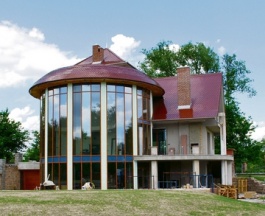
The villa built without permission in Pardubice is on the way to legalization
 |
"When changing the zoning plan, the area is viewed as if no building is standing there; it is also not legally there. A part of the land measuring about 500 m² is designated for residential purposes, which is a negligible portion compared to the buildable areas defined in the Pardubice zoning plan. From an urban planning perspective, it has no impact," said Kamila Zárubová from the city's chief architect's department to ČTK.
The house is located in the area Na Ležánkách adjacent to the Na Špici park near the confluence of the Elbe and Chrudimka rivers on land that is not entirely designated for construction; part of it is marked as recreational green space. In the past, the Supreme Administrative Court decided on the removal of the building. However, in June 2012, the councilors voted that a change to the zoning plan would be made to allow it to be retroactively legalized, and subsequently, the building authority suspended the enforcement proceedings aimed at demolishing the structure. Holeček is paying for the amendment to an architectural studio hired by the city.
Architect and Pardubice councilor Milan Košař (Pardubáci) considers the concession from Pardubice to be a mistake. "This is a completely non-standard procedure, but the council decided this way, and procedurally it is correct," he told ČTK. The request for the change to the zoning plan in favor of the Holeček couple was submitted by ODS councilor Miroslav Baťa. According to Košař, while it was not necessary to insist on the demolition of the "illegal building," the city could have imposed a significant penalty on the entrepreneur. "A reasonable compromise could have been for him to pay a relatively substantial fine, which he would probably have gladly done, and that could have funded part of the adjustments to the Na Špici park that the city is planning," Košař stated. Holeček received a fine of 200,000 crowns for the illegal building.
According to Jiří Vopršal, the head of the building authority, once the amendment to the zoning plan is approved, it will be possible to legalize the building retroactively. The suspended enforcement proceedings would be stopped, and additional penalties would not be justified.
The English translation is powered by AI tool. Switch to Czech to view the original text source.
4 comments
add comment
Subject
Author
Date
opravdu je vše jen otázkou výše pokuty?
Josef Smola
28.01.14 09:42
To je překvapení
raval
28.01.14 09:39
Architektura obrazem sve doby.
takyarchitekt
28.01.14 11:55
Aha...
Ondra Lukeš
29.01.14 09:48
show all comments
Related articles
0
07.02.2025 | Entrepreneur Holeček won a court case against Pardubice over noise from the playground
1
06.10.2014 | The villa built without permission in Pardubice is heading towards legalization
0
13.05.2014 | The illegally built villa in Pardubice has a chance for legalization
1
12.10.2012 | The black-built villa in Pardubice will not be demolished
14
24.09.2012 | The entrepreneur Holeček will probably not have to demolish his villa
0
27.06.2012 | The black villa of entrepreneur Holeček in Pardubice has received another chance
3
15.05.2012 | Pardubice rejected another attempt by the businessman to save the villa
1
30.04.2012 | Owner of the illegally built villa: The zoning plan will be voted on
1
25.04.2012 | The black-built villa will most likely disappear, the zoning plan will not change
0
23.03.2012 | The businessman complicates the construction in Pardubice, wants to preserve the villa
15
04.11.2011 | The court decided on the demolition of an unauthorized villa in Pardubice











